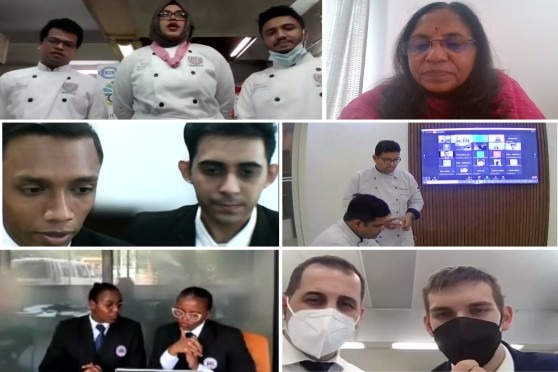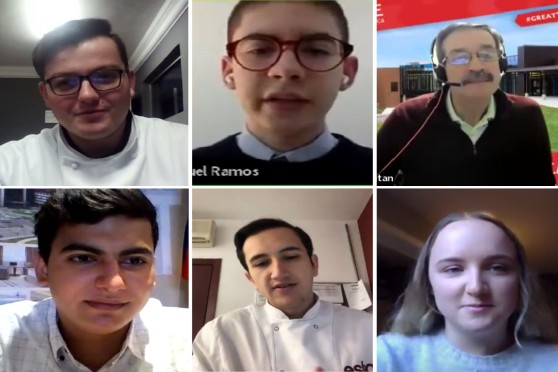11 countries present research on hospitality at IIHM International Young Chef Olympiad


In-depth research is an essential part of culinary art and, keeping that in mind, the 8th International Young Chef Olympiad (YCO) presented by the International Institute of Hotel Management (IIHM) has introduced the International Diamond Research Award.
Eleven presentations were made by the student and mentor teams of the participating institutes. Each team was given a total of 10 minutes to present their case in front of the panel. On the panel were Rupa Datta, deputy director and programme leader at IIHM; and Kavitha Reddy, nutritionist and director, Sreya Nutrition. The results of the presentation will be announced on February 5.
“The research symposiums are an integral of the entire culinary experience for the young chefs. It would enhance their understanding of what the hospitality industry is all about. Of course, cooking is very important but they also have to understand the business part, the commercial part, and kitchen management. This symposium will add to their knowledge. They will be richer when they can apply this to their own life,” said Suborno Bose, founder and chief mentor of IIHM and the Indismart Group.
The innovative research papers …

Bangladesh: Sumaiyya, Syed Anwarul Raihan and Mohammad Habibullah, students of National Hotel and Tourism Training Institute, Dhaka, presented a paper on Street Food Habits in Dhaka City. The students highlighted the commonly loved and available street foods and researched both the vendors and customers. Based on the research parameters, they concluded that most street food vendors are trying to maintain hygiene levels given the COVID conditions. With a little consciousness and push, they might be able to achieve excellent standards of hygiene in the future.
Canada: Chef mentor Fintan Flynn from Canadore College presented his research paper on Food Waste in Canada. The research was conducted keeping in mind the growing concerns about food waste in the country. Its objective was to develop new approaches, innovate ideas of consumer education and make a full analysis of regulatory barriers to reduce waste.
England: Emily Fairweather from Sheffield Hallam University, UK, focussed on conservation practices at animal visitor attractions such as zoos, national parks, or adventure parks. Flora and fauna preservation forms an inevitable part of the UNSDG, especially Goals 12, 14, and 15. Her research delved into the practices carried out at animal visitor centres and whether they are sustainable practices for fauna preservation and safeguard or not.
Equatorial Guinea: The students of Grand Hotel Djibloho Culinary International School researched actions that can be taken to improve water quality in Equatorial Guinea. The paper was presented by the in-house translator.
India: Conducted and presented by Saket Siri and Uzair Ahmed of International Institute of Hotel Management brought to the forefront the Young Chef Olympiad and how it provides a global platform for culinary and cultural exchange, all the while following the United Nations goals.
Italy: Matteo Cignetti from Docente Technico Pratico- Ecole Hoteliere de la Vallee d'Aoste not only discussed the 17 Sustainable Development Goals put forward by the United Nations but also tried to highlight innovative ways of implementing them at the individual and community levels.
Kenya: Chorus Ruth and June Bruce of Boma International Hospitality College looked into the aspect of inclusion in the hospitality industry. The research aimed to find out how differently abled individuals were included in workplaces and what strategies are being adopted by the industry for such inclusion.
Mexico: Miguel Ramos from the Gastronomy School of Anahuac University brought to the forefront the utilities of the Anahuac Vineyards. His research discussed ways through which the vineyard space could be utilised to share knowledge and development among the employers, trainees and customer base.
Namibia: Terence Jenkinson of Silver Spoon Hospitality Academy presented a paper highlighting the 17 Sustainable Development Goals.
Nepal: Education is a major part of the United Nations programmes. Taking this point forward, chefs Mayank Garg and Saikat Das from the Academy of Culinary Arts and Hospitality Management presented a paper on How to Improve Young Minds by Involving Innovative Educational Methods.
Spain: Nicholas Merchan Zapata from Escola Superior d’Hostaleria de Barcelona emphasised the need to recycle. In keeping with the United Nations Sustainable Development Goals, he presented ways to manage food waste and how to reduce the same by engaging in recycling practices.